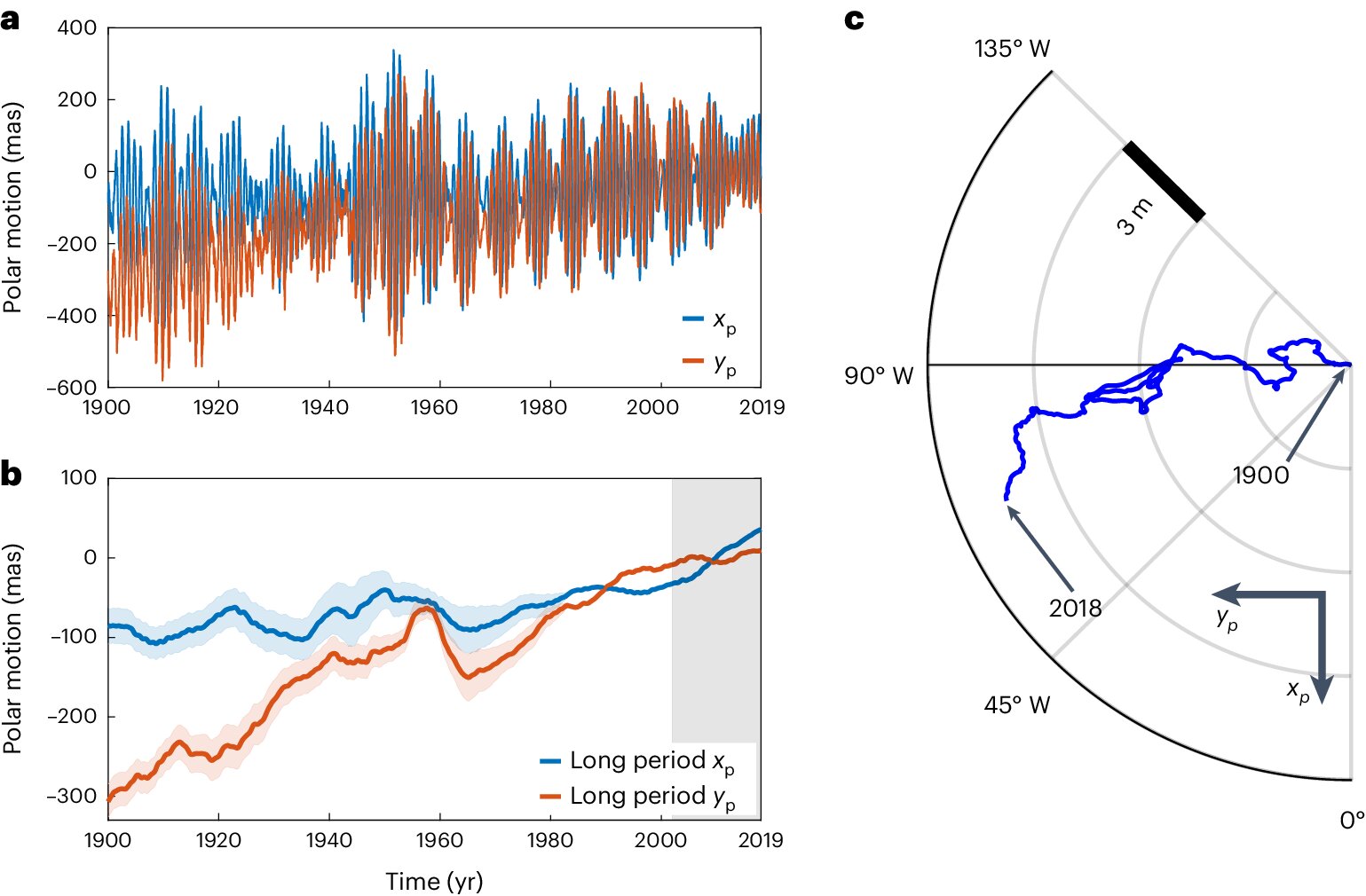It’s far from the most important effect of a hotter world, but rising temperatures are slowing the Earth’s rotation, making the days longer. The effect is certainly small, but new research predicts that in a high emissions scenario the knock-on consequences of human activity will exert a greater influence over the rate the Earth turns than the tidal effects of the Moon. The same human activities are even moving the location of the North Pole slightly.
The rate at which a body spins is affected by the distribution of its mass. Physics teachers have been demonstrating the concept for decades by putting students on swivel chairs and having them control their speed by holding weights out or pulling them to their chests. It’s only recently, however, we have realized we’re doing the same thing the entire planet.
It takes more rotational energy to turn mass at the planet’s equator than its poles. The Earth formed with a great deal of rotational energy, a little of which it is losing to the Moon, without gaining much in compensation, so when mass moves from the polar regions to the tropics, it has to translate to slower spin.
The icecaps are melting and tropical seas rising, so it is not a surprise that temperature changes are accelerating the rate at which the days are getting longer, something that was identified recently.
However, the distribution of water and ice at the Earth’s surface is just one of many factors that influence the speed of the Earth’s rotation. For example, the Sun and Moon have opposing effects through the tides, although usually the Moon’s dominates. There are also changes in the rotation rate of the Earth’s core, which can be partially transferred to the surface.
Calculating the strength of these effects is challenging, so the Earth can surprise us slightly in whether the days get longer or shorter, and by how much, over a period of months or years. However, Professor Benedikt Soja of ETH Zurich and colleagues argue a hotter planet is already contributing to lengthening the days, and this effect has accelerated this century. If greenhouse gas emissions continue to increase the strength of this effect will double by 2100, they conclude, in the process overtaking that of the Moon.
“We humans have a greater impact on our planet than we realize,” Soja said in a statement. “And this naturally places great responsibility on us for the future of our planet.”
Polar ice has melted before, most recently about 10,000 years ago, which would also have led to longer days. However, the process then was a great deal slower than what is occurring today, so the effects were probably smaller than the steady lunar influence.
If the melt was occurring symmetrically across both Arctic and Antarctic then that might be the only effect on the Earth’s rotation. However, we know there is a great deal more ice to melt in some directions than others, and the most vulnerable areas are concentrated in specific locations. A related study from the same team explains that as a result, the Earth’s axis of rotation is shifting slightly.
The movement is small – a matter of a meter a decade or so in the poles’ location. Here again shifts are taking place for other reasons. Continental drift caused by plate tectonics plays a role, as well as thermal movements in the planet’s core and even the slow rebound of crust once pushed down by ancient ice sheets.
Geophysicists have been tracking these movements, finding the North Pole has been migrating roughly in the direction of Hudson Bay for a century, although more recently the direction has turned. Including ice melt has allowed the team to produce a model that matches what has been observed.
“For the first time, we present a complete explanation for the causes of long-period polar motion,” said lead author of both studies Mostafa Kiani Shahvandi, one of Soja’s doctoral students. “In other words, we now know why and how the Earth’s axis of rotation moves relative to the Earth’s crust.”

Melting caused by human-induced climate change is an increasing contributing factor to the movement of the poles.
The Gaia hypothesis proposes the Earth is a self-regulating system, and if so it seems this extends deep within the planet. “Climate change is causing the Earth’s axis of rotation to move, and it appears that the feedback from the conservation of angular momentum is also changing the dynamics of the Earth’s core,” Soja said.
Soja, Shahvandi and co-authors are not being alarmist about these effects, noting that they are too small and too slow to worry about, unlike many other aspects of human-induced climate change. Nevertheless, such matters do sometimes need to be taken into account. Soja gives the example of the need to know the Earth’s precise speed when launching certain space probes, not the speed as it was decades ago.
The work also supply two further ways of checking that the planet is in fact heating up, where the evidence from other sources not already so overwhelming as to make it unnecessary.
The research into the slowing day is published in Proceedings of the National Academy of Sciences. The exploration of the wandering pole is published open access in Nature Geoscience.
Source Link: Climate Change Is Making Days Longer And Could Soon Exceed The Moon’s Influence